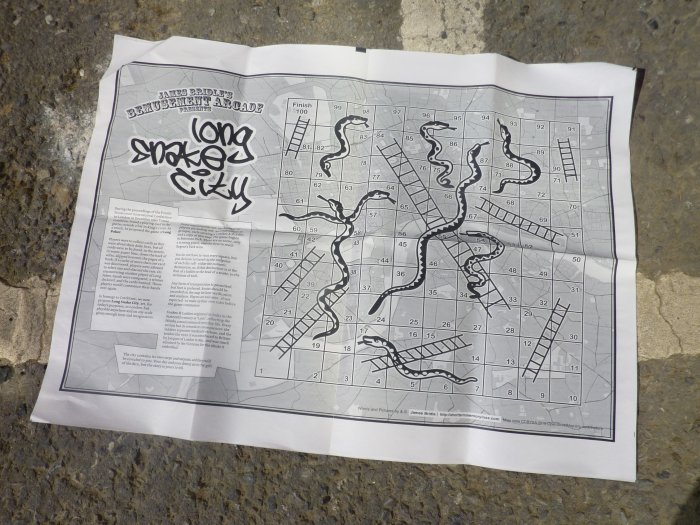It was the second Gamecamp on Saturday, and by all accounts it was a huge success. I couldn’t attend, but I was asked to contribute something to the one-off newspaper produced for the day. The result is above, with the text below.
During the proceedings of the Fourth Situationist International Conference in London in December 1960 Tomas Coteblanc found a playing card in the gutter outside a bar in King’s Cross. As a result, he proposed the game of Long Poker.
Players were to collect cards as they went about their daily lives, but all cards were to be found: in the streets, in waste-paper bins, down the back of sofas, slipped between the pages of a book. If a cache of more than one card was discovered, players were allowed to select one and discard the rest. On encountering another player of Long Poker, hands were compared, a winner declared, and the cards burned. Those players would commence their hands over again.
In homage to Coteblanc, we now propose Long Snake City, set, for today’s purposes, in London, but playable anywhere and on any scale given enough time and imagination.
Game requirements are: any number of players (including one, and individuals or groups), each carrying a London A-Z, a die, and a copy of this map. The game begins in Battersea Park. There are no turns, only a starting pistol, and the first to reach Regent’s Park wins.
You do not have to visit every square, but you do have to travel via the endpoint of each die roll – either the numeric destination, or, if that destination is at the foot of a ladder or the head of a snake, to the terminus of each.
Any form of transportation is permitted, but foot is preferred. Routes should be recorded on the map for later verification and analysis. Players are welcome – if not expected – to make up their own rules before the game commences.
Snakes & Ladders originated in India in the Sixteenth century as “Leela”, reflecting the Hindu consciousness of everyday life. Every action has its rewards or consequences: the ladders represent mankind’s virtues, and the snakes the vices. It was introduced to Britain by Jacques of London in 1892, and was much admired by the Victorians for the ideals it embodied.
The city contains its own steps and serpents, and they will be revealed to you. Your day and your destiny are in the gift of the dice, but the story is yours to tell.

[…] or when meta-data gets used to make physical Christmas decorations, or… well, I could go on and on and […]
Pingback by Now is the time for experiments « Solipsistic Pop — June 7, 2010 @ 1:24 pm